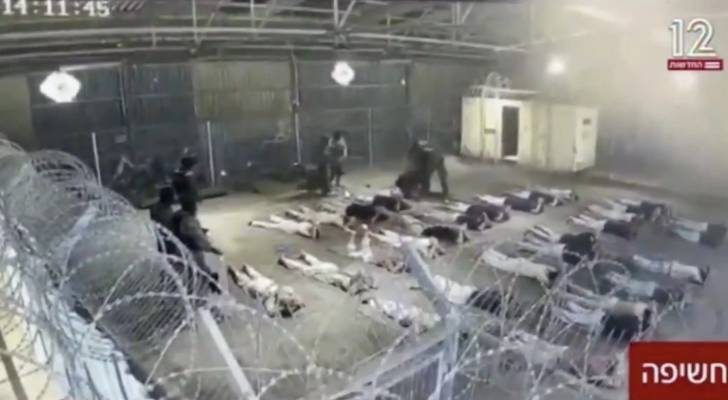Analysis: 'Israel' has an image to protect, a crime to ignore
Note: AI technology was used to generate this article’s audio.
- Leak from 'Israeli' military facility exposes torture, sexual assault, and cover-up.
- Former military prosecutor arrested for revealing war crime video.
The leaked surveillance footage from the Sde Teiman military facility in August 2024 did more than expose a horrific act of sexual assault and torture against a Palestinian detainee; it exposed a profound institutional crisis in 'Israel'.
The brutal event - involving five reserve soldiers, a stabbing with a sharp object, and a victim left with a torn rectum and multiple fractures - was shocking.
But the reaction from the 'Israeli' state and its political establishment was, in many ways, more revealing.
Instead of a moment of national reckoning over a documented war crime, the scandal immediately pivoted. It became a story not about the perpetrators, but about the leak. The incident and its aftermath provide a stark analysis of a state apparatus far more concerned with managing its public image than with confronting the systemic brutality it oversees.
The Reaction: Damage Control Over Justice
The Sde Teiman assault was not an isolated incident. It occurred in a facility already notorious as a "torture camp" by human rights groups, against a backdrop of systematic abuse, medical neglect, and the documented deaths of at least 75 Palestinian political prisoners in 'Israeli' custody since October 7, 2023.
Given this context, the official response was telling. The reaction from the highest levels of government was not one of moral horror at the act itself, but of crisis management.
'Israeli' Prime Minister Benjamin Netanyahu defined the problem not as the assault, but as its exposure, calling the leak the "most serious public-relations attack" against 'Israel' to date. This single statement reframes the entire scandal. The primary victim, in this view, was not the tortured detainee, but the state's image.
This sentiment was echoed by a fierce defense of the accused soldiers from the political far-right, who painted them as heroes being unfairly prosecuted. The national conversation was successfully diverted from the crime to the "damage" caused by its revelation.
Shooting the Messenger: The Whistleblower Paradox
In a twist that defines the entire affair, the most severe institutional consequences were reserved not for the perpetrators, but for the person who exposed them.
The whistleblower was not a low-level conscript but the former Military Advocate General (MAG), Maj. Gen. Yifat Tomer-Yerushalmi. Her motive was complex: she stated she leaked the video to counter the intense political pressure that accused the military justice system of unfairly prosecuting soldiers. In her view, the video was proof that the system was working and holding abusers accountable.
The state's response was to arrest her.
Tomer-Yerushalmi was detained for several days on suspicion of serious offenses, including obstruction of justice and unlawful disclosure of classified information. Critics immediately noted the disparity: the five soldiers accused of the brutal assault faced fewer restrictions than the former head of military justice who exposed them.
This action sent an unmistakable, detrimental message: in the new hierarchy of offenses, exposing military misconduct is a more grievous crime than committing it. The system sought to silence the whistleblower with more alacrity than it sought justice for the victim.
The Global Whistleblower's Dilemma
Is this treatment of a whistleblower unique? Not entirely, but the 'Israeli' case has a distinct and alarming character.
Globally, states are notoriously hostile to whistleblowers who expose national security secrets. The United States, for example, has used the Espionage Act to aggressively prosecute those who leak classified information, regardless of their intent or the public interest.
- Chelsea Manning, a former Army soldier, was sentenced to 35 years in prison (later commuted) for releasing military and diplomatic documents that exposed, among other things, evidence of US war crimes.
- Edward Snowden, a former NSA contractor, has been forced into exile in Russia and faces espionage charges for revealing the extent of global mass surveillance programs.
While many countries, particularly in the EU, have robust laws to protect corporate or financial whistleblowers, these protections almost universally evaporate when it comes to the military, intelligence, and national security sectors. In this regard, a state protecting its secrets and punishing a leaker is a grimly familiar pattern.
However, the Sde Teiman case differs in a crucial way. The backlash against Manning and Snowden was primarily justified by the argument that they had "damaged national security" and "aided the enemy" by revealing methods and secrets.
The 'Israeli' backlash, by contrast, has been a vocal, populist defense of the crime itself. The political outrage was not that Tomer-Yerushalmi exposed a classified location or method, but that she exposed an act of brutality.
Netanyahu’s "public-relations attack" framing confirms the core issue was shame, not security.
The institutional response became a frantic effort to punish the person who brought the shame, rather than the one who caused it.
Conclusion: A Narrative War
The Sde Teiman scandal is a microcosm of a state increasingly trapped by its own actions. The documented, systemic abuse of over 10,000 Palestinian detainees post-October 7 created an environment where such atrocities were inevitable.
When one of those atrocities was finally caught on camera and leaked by the military's own former chief lawyer, the state had a choice: transparency and accountability, or narrative and image.
It chose image. By arresting its own former Military Advocate General, the 'Israeli' establishment signaled that the true "front" in this war is one of public relations. The clear objective is to ensure that the torture, the starvation, and the sexualized abuse detailed by the Palestinian Prisoner's Club and UN reports can continue as long as no one dares to show the evidence.




